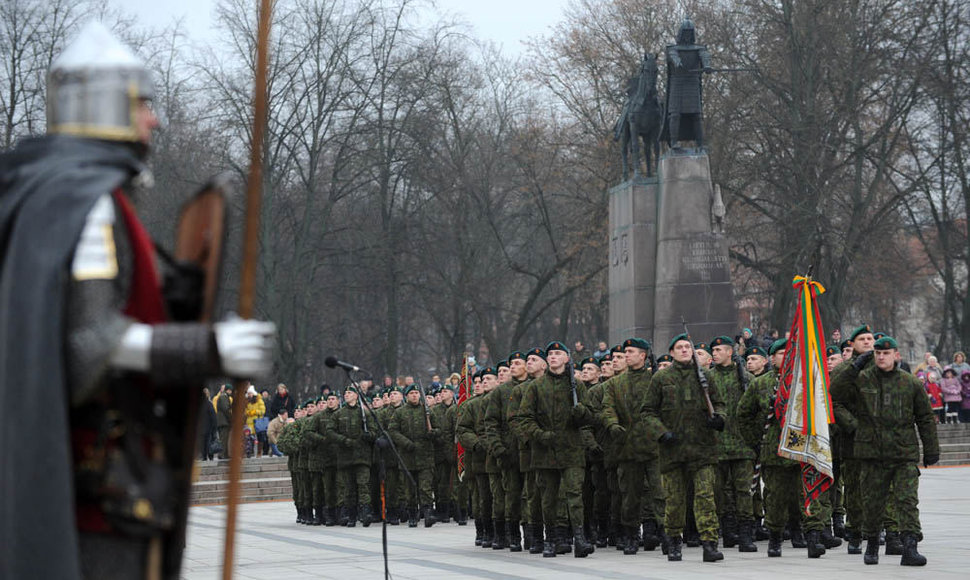According to the new government program that has been opened in parliamentary discussions, efforts will be made to "actively contribute to world peace and security, develop Euro-Atlantic cooperation as the key condition of national security," the EU and NATO will be considered as the most important organizations, defense relations among European countries with be reinforced.
"We will strengthen the common EU security and foreign policy and avoid overlapping with the main security guarantee – NATO. We will enhance our weight in decision-making regarding elimination of conflicts and causes for terrorism in zones of peacekeeping and humanitarian aid crises," reads the document.
"On a regular basis, we will provide an assessment of threats to the state, considering the emerging new risk factors, we will ensure timely adjustment and revision of national security and defense strategic areas, action plans, and envisage efficient measures for ensuring national security. We will monitor threats to national security, with a special focus on the new ways of influencing public and political life – via information technologies, various forms of ownership of media, and culture," the program says.
Defense cooperation with the United States is not referred to in the document.
In comment of the ruling parties' plans in fields of national defense and security, defense policy expert Aleksandras Matonis said the program, in this respect, was "a collection of politically correct phrases, which, at the first glance, cannot be criticized by NATO Allies and the supreme commander of the Armed Forces, the president."
Matonis said the first aspect worth criticism was that, as compared with the program of the outgoing center-right government, the new government's program does not refer to Russia and the threats it may cause. In his words, this "removes an important guideline setting the direction of defense orientation."
The expert said it was also "alarming to see the clear shift to reinforcement of inefficient security mechanisms of the European Union."
"The idea, which is strongly supported by Euro-bureaucrats and Euro-enthusiasts who don't have an idea of the continent's defense matters, is as effective as resuscitating a dead man. There is an actual threat that during Lithuania's presidency the EU may make costly decisions that allegedly feature European solidarity but yield no actual benefits for Lithuanian defense, for instance, more active participation in EU combat groups and dispatch of forces to EU missions," Matonis told BNS.
"The line-up of the priorities is also eye-catching, for example, the sentence about the most important organizations lists the European Union before NATO. Failure to refer to Russia as a threat for Lithuania and the Alliance and putting the EU above NATO are two alarming aspects, which should put the new government to an exam from both NATO and its most active members – our Allies," he said.
Meanwhile, Deividas Šlekys, a lecturer at Vilnius University's International Relations and Political Science Institute, told BNS that "the new administration speaks a lot less about the territorial defense of Lithuania." Nevertheless, in his words, "the conservative legacy may remain in the existing documents, which are not easy to change."
"We have an approved secret concept of state defense, which cannot be changed easily and it would require a green light from the president. This year, the country approved a new National Security and Military Strategy. Nobody will change these documents, as they're new," he said.
Both Šlekys and Matonis noted the importance for Lithuania to develop anti-tank and anti-aircraft defense capacities, however, the program of the center-left government does not say anything about it.
"About the weaponry – we indeed need helicopters and they will be bought, only the number is unclear. We also need to renovate the fleet of armored vehicles, this will require substantial funds. In my opinion, anti-tank and anti-aircraft weaponry should also be developed, as it is one of the efficient ways for an army of a small country to prepare for countering a conventional attack," Šlekys said.
"The document does not speak about the matters of utmost importance – enhancement of anti-aircraft and anti-tank defense capacities and acquisition of relevant means," Matonis said.
The new government will take office after parliamentary approval of its program, the ministers will then take an oath. The ceremony is expected to take place on Thursday.












